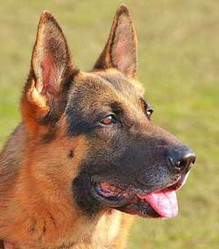Using German dog commands when training your dog has many advantages, the most important one being that there is little chance that your dog confuses an everyday word with a command. Imagine you have trained your dog that 'OK' means he can go up and run around freely and you have a conversation with a friend that asks you 'Would you like to go to the movies this week?' and you say 'OK!' Your dog might mistake that for 'Hey, s/he said I can run around now ;-)' If that happens at home or in the yard, no harm done, but imagine it happens close to a busy road! You get the picture ... By using words in dog training that you don't use otherwise, you can really fool proof yourself against such mistakes. So here my list of German dog commands and just in case you wonder, I am a native German speaker ;-)

German Dog Commands
by Sam
A list of the most common German dog commands, with pronunciations and examples.
German Dog Commands Youtube
Basic German Dog Commands
Sitz, Platz and Komm!
- Sitz (Sit) - Pronounced 'sitss' with a nice long 's' at the end.
- Platz (Down) - Pronounced 'plutz' with emphasis on the 'u' like in the English word 'under'.
- Komm (Come or Here) - Pronounced 'kom'
- Hier (Here or Come) - An often used alternative to the above, pronounced the same way like the English word 'here'.
The German video above gives you also some idea of the correct pronunciation. Just remember, even if you speak German to your dog to keep your voice happy, they might be called 'commands', but your dog will work with more gusto for you if you don't yell at him ;-)
Oh, and in case you wonder, you can still also speak English, or any other language for that matter, to your dogs as they learn words / commands, but they don't 'learn' a language. So no need to fear that you could confuse your dog by training him 'bilingual'. Just make sure that you use different commands for different things, a favorite mistake is, for example to use 'Down', or the German equivalent 'Platz' for both laying down and getting off the couch and to the dog's place ...
Recommended Dog Training Books
... in English ;-) Click images for more information!
 |  |  |
| When Pigs Fly!: Training Success with... | Dog Behavior: An Owner's Guide to a H... | Control Unleashed: Creating a Focused... |
More German Dog Commands
- Fuss (heel) pronounced 'Fooss'.
- Bleib (stay) pronounced 'Blyb'.
- Bring (fetch) pronounced 'brrynk' or Apport pronounced 'Ahport'.
- Aus (release something) pronounced 'Owss'.
- Pfote (shake hands) pronounced 'Phota'.
- Voraus (ahead) pronounced 'Forouss'.
- Rechts (right) pronounced 'Rexs'.
- Links (left) pronounced 'Links'.
- Hopp (jump) pronounced 'Hop'.
- Such (search) pronounced 'Sooch'.
- Pass auf (keep guard) pronounced 'Pass Owf''.
- Gib Laut (bark) pronounced 'Geb Lout'.
- Nein (no) pronounced 'Nine'.
So, now you know how to train your dog in German to be a 'Guter Hund! - a Good Dog ;-)
Other Advantages of Using German Dog Commands
Apart of avoiding confusion and misunderstandings with everyday words, using German dog commands can also help to avoid that another person handles your dog too easily. That can be an advantage or a disadvantage depending on how you see it. So if you rely on other people, like dog walkers or dog sitters, you either have to teach them German or stick with English only ;-) If, on the other hand you want your dog only listening to you and nobody else having a common 'secret language' between the two of you can help with that!
Clicker Training, train your dog the positive way!
... click images for more info!
 |  |  |
| HoAoOo Pet Training Clicker with Wris... | OYEFLY Dog Training Clicker with Wris... | Training Clicker for Pet Like Dog Cat... |
You might also like
Training Your Dog with DistractionsHow to get your dog to listen to you when there are more interesting things t...
How to Deal With Your Barking DogDogs bark for a lot of reasons. It can have consequences for the owner, howev...




 How to Choose the Topic for your First Bookon 12/17/2012
How to Choose the Topic for your First Bookon 12/17/2012
 Why I published my first book on Amazon - and you should too ;-)on 11/30/2012
Why I published my first book on Amazon - and you should too ;-)on 11/30/2012
 What to do with Kids in Prague - Go To the ZOOon 10/30/2012
What to do with Kids in Prague - Go To the ZOOon 10/30/2012
 Choco Story Museum - Things to do with Kids in Pragueon 10/30/2012
Choco Story Museum - Things to do with Kids in Pragueon 10/30/2012



Comments
Dracula ? ;-) SY
I've heard people in Transylvania use German with their dogs. It sounds so cool! :-)
Thanks for your comment Moosebeam973, I hope you get a dog soon, life is simply better with a canine companion, no matter which language you speak to it ;-) SY
Yes Tolovaj, having a dog is essential for this ;-)
I like the idea of secret language. German is enough familiar to me (bordering on Austria and being a fan of Bayern for as long as I remember), to learn advanced dog commands (I know basic ones already).
Now I just need a dog...
Lol Brenda, you don't need a dog of a 'German' breed to try this, your dogs will do just fine even if they are 'pure Americans' ;-) Give it a try, dogs normally love to learn new stuff!
I don't have a German Shepard, but I do have four other dogs. Maybe I should try this on them. Thanks for the article.
Lol, Wisefool, yes I do know that kind of dog also - they do read your body language well those canines! That is the secret, as long as your body language stays the same it really doesn't matter what language / words / commands you use - German or others ;-) Might need to write an article about hand signals and body language in dog training soon ;-)
What a great idea! I'd never even thought of training using a different language to avoid confusion with everyday conversation. Thanks for all the useful commands in German, Sam. Although, I must say, I have known dogs who were 'mind readers' - their owners didn't even have to open their mouths, they simply had to think 'sit' or 'lie down' and the dog would do it. Clever little critters our canine pals.